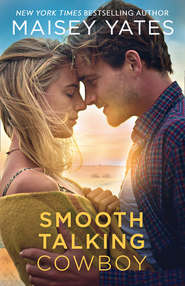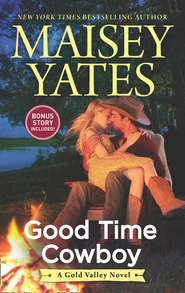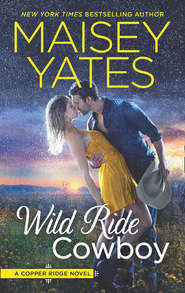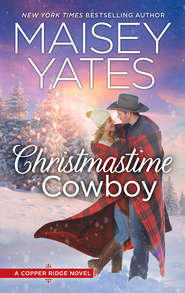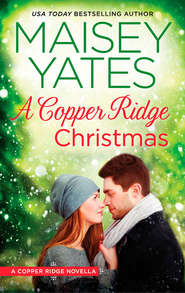По всем вопросам обращайтесь на: info@litportal.ru
(©) 2003-2025.
✖
Cowboy Ever After: Big Sky Mountain
Настройки чтения
Размер шрифта
Высота строк
Поля
“They forgot all about me,” Shea murmured, staring after her stepparents and Opal as they retreated.
“No, sweetheart,” Kendra said quickly. “They’re just excited because the baby’s coming and maybe a little scared, that’s all.”
Shea bit her lower lip, swallowed visibly, and rummaged up a small, tremulous smile. “A baby brother will be hard to compete with,” she reflected. “Especially since he really belongs to them and I don’t.”
Kendra knew Shea adored Slade—her mother, his ex-wife, was remarried and living in L.A.—and she also knew that Slade loved this girl as much as if he’d fathered her himself. And Joslyn loved her, too.
“You belong to them, too, Shea,” Kendra assured the girl. “Don’t forget that.”
Madison, perhaps sobered by Shea’s mood—the two had been hanging out together since Madison and Kendra had arrived with Hutch—slipped her hand into Kendra’s and looked up at her with wide, solemn eyes.
“Are babies better than big kids?” she asked very seriously.
Kendra’s heart turned over. “Babies are very special,” she answered carefully, “and so are the big kids they turn into.”
As she spoke, Hutch stepped into her line of sight, and something happened inside Kendra as she watched him watching Slade and Joslyn’s departing vehicle. Opal sat tall and stalwart in the backseat.
What was that look in his eyes? Worry, perhaps? Envy?
Back in high school, Kendra recalled, Joslyn had been Hutch’s first love and he hers. Most people had expected them to marry at some point, perhaps after college, but they’d grown apart instead, from a romantic standpoint at least. They had remained close friends.
She, Kendra, had been his second love.
Maybe that was why he hadn’t stepped in when she threw herself into an ill-fated relationship with Jeffrey Chamberlain, way back when. Possibly, letting her go had been easy because he hadn’t really been over Joslyn at that point.
In fact it could well be that he still wasn’t over her, even though she was happily married to his half brother and about to give birth to their first child.
Now you’re just being silly, Kendra scolded herself silently, straightening her spine and raising her chin. Besides, what did it matter who Hutch Carmody did or did not love? He’d hurt every woman he’d ever cared about—except Joslyn.
“Do you want me to drive you to the hospital?”
The question had come from Hutch and he was looking at Shea as he spoke. Although he and Slade were still working on being brothers, he was already an uncle to Shea and she was a niece to him.
Shea shook her head, slipped away from Kendra’s side and held out a hand to Madison. “The three-legged race is starting soon,” she said to the little girl. “Want to be my partner?”
Madison nodded eagerly and crowed, “Yes!” for good measure, in case there might be any ambiguity in the matter.
“Let’s go check out the prize table then,” Shea said. And just like that, they were off, racing through the grass, Daisy and Jasper, the Barlows’ dog, bounding after them.
“Slade and Joslyn do realize,” Kendra began, without really meaning to say anything at all, “that Shea is worried that they won’t love her as much once the baby is here?”
Hutch, standing nearer than she’d thought, replied quietly, “Slade and I may have our differences,” he said, “but the man is rock-solid when it comes to loving his family.” A pause followed, then a wistful, “Not a trait he learned from our dad.”
Picking up on the pain in his words, she looked at him directly.
They were essentially alone together, under those leafy, breeze-rustled trees, because everyone else had gone back to what they were doing before Joslyn had gone into labor—setting out food, pulling weeds, mowing grass, generally getting ready for the festivities that would follow on the heels of the cleanup effort.
Hutch, meanwhile, looked as though he regretted the remark about John Carmody, not because he hadn’t meant it, but because it revealed more than he wanted her or anyone else to know.
“Tell me about your dad,” Kendra said, pushing the envelope a little. She remembered the elder Carmody clearly, of course, but she hadn’t really known him. He’d been a grown-up, after all, and a reserved one at that, handsome like Slade and almost religious about minding his own business.
Hutch took her hand, and she let him, and they drifted away from the others to sit on rocks overlooking the town of Parable, nestled into the shallow valley below. “Not much to tell,” he said in belated reply to her earlier request. “The old man and I didn’t see eye to eye on most things, and he made it pretty plain that I didn’t measure up to his expectations.”
“But you loved him?”
“I loved him,” Hutch confirmed, staring out over the town, past the church steeples and the courthouse roof. “And I guess, in his own way, he probably loved me. Do you remember your dad, Kendra?”
She shook her head. “He was long gone by the time I was born,” she said.
Remarkably, as close as they’d been, she and Hutch hadn’t talked much about their childhoods. They’d been totally, passionately engrossed in the present.
Now Kendra thought about her mother, Sherry, beautiful and flaky and too footloose to raise a little girl on her own. In a moment, Kendra was right back there, like a time traveler, standing in the overgrown yard in front of her grandmother’s trailer, clutching Sherry’s fingers with one hand and gripping the handle of a toy suitcase in the other.
She’d been five years old at the time, only a few months older than Madison was now.
“I’ll be back soon, I promise,” she heard Sherry say as clearly as if a quarter of a century hadn’t passed since that summer day. “You just sit there on the porch like a good girl and wait for your grandma to get home from work. She’ll take care of you until I can come and get you.”
Maybe the suitcase, hastily purchased in a thrift store, should have been a clue about what was to come, but Kendra was, after all, a child and a trusting one at that. She hadn’t known she was being lied to, not consciously at least.
Most likely Sherry hadn’t known she was lying, either. Never mean, Sherry had always meant well. She just had trouble following through on her better intentions.
In the end, she’d leaned down, kissed Kendra on the top of her head, promised they’d be together again soon, this time for good. They’d get a house of their own and a dog and a nice car.
With that, Sherry waggled her fingers in farewell, climbed into her ancient, smoke-belching station wagon and drove away.
Kendra simply sat and waited—it wouldn’t have occurred to her to wander off or run after Sherry’s car.
When her grandmother arrived home a couple hours later, she got out of her car, lit up a cigarette and drew deeply on the smoke. Then she crossed the overgrown yard to stand there frowning down at Kendra.
With her bent and buckled plastic suitcase beside her, Kendra looked up into her grandmother’s lined and sorrow-hardened face, and saw no welcome there.
“Just what I need,” the old woman had said bitterly. “A kid to take care of.”
But Alva Shepherd had given Kendra a home, however reluctantly.
She’d put food on the table and kept a roof over their heads and if love and laughter had been lacking from the relationship, well, nobody had everything. If Sherry hadn’t dropped her off that day, she probably would have been killed in the car accident that took her mom’s life six months later.
After that, her grandma had been a little nicer to her, not out of compassion—she didn’t seem to grieve over losing a daughter or Kendra’s loss of her mother, apparently regarding it as a fitting end to a misspent life—but because Kendra became eligible for a small monthly check from the government. That made things easier all around.
“Kendra?” Hutch tugged her back into the here and now, still holding her hand.
“There are too many broken people in this world,” she said, thinking aloud.
Hutch simply gazed at her for a long, unreadable moment. “True enough,” he agreed finally, almost hoarsely. “But there are plenty of good ones, too, built to stay the course.”
Happy noises in the distance indicated that the games were about to start and picnic food was being served. Hutch was right, of course—these sturdy people all around them were the proof, teaming up to tend the grounds of a decrepit old cemetery, to serve potato salad and hot dogs and the like to old friends and new, to hold races for children who would remember sunny, communal days like this one well into their own old age.
In that moment, Kendra felt a wistful sort of hope that places like Parable would always exist, so babies could be born and grow up and get married and live on into their golden years, always in touch with their own histories and those of the people around them, always a part of something, always belonging somewhere.







